Moving this community to !linguistics@mander.xyz
UPDATE, 2024/JAN/17: this address has been locked so mods only can post. Use the new one....
This magazine is from a federated server and may be incomplete. Browse more on the original instance.
UPDATE, 2024/JAN/17: this address has been locked so mods only can post. Use the new one....
I’ve tried looking for this project all over Libgen, Internet Archive and similar sites, but could not find it anywhere. I was only able to come across a Reddit post with the physical copies of the book.
Interesting paper, about the alleged ability of LLMs* to judge the grammaticality of sentences - something that humans are rather good at. Eight phenomena were tested, and LLMs performed extremely poorly....
https://lemmy.ml/pictrs/image/07a53321-b38e-47b6-92aa-785a2fdc60e6.png

I’m creating this thread to hopefully promote a bit more activity in the community....
cross-posted from: slrpnk.net/post/4507295...

Even if not solid research, I think that this article is worth sharing as food for though....


The article shows a case of language contact (Tsimané vs. Spanish) triggering the conceptual split of a colour into two.


The word éxito in Spanish (and cognates in other iberian romance languages) has the meaning of success, but it is a cognate of English “exit”....
Linguist Marina Yaguello traces the myths, legends, and religious narratives that have shaped humanity's understanding of the origins of language.


The languages in the Indo-European family are spoken by almost half of the world’s population. This group includes a huge number of languages, ranging from English and Spanish to Russian, Kurdish and Persian....

A great video explaining why the standard English vowel transcription system is outdated....

Fluency in ‘inglese farlocco’ has become necessary in Italy as hybrid words and off-kilter meanings proliferate.
As Evile and Pesetsky show in a newly published paper, “whom of which” obeys very specific rules, whose nature contributes to a larger discussion about sentence construction. The paper, “Wh-which relatives and the existence of pied piping,” appears this month in the journal Glossa....

without the filler:...

I was discussing this with my fiance, and she agreed with me in that she also speaks English in this manner....
This video offers a nice introduction on the comparative method, used to reconstruct languages without direct attestation, and then talks a bit about the reconstruction of Proto-Indo-European. It’s full of examples and rather accessible, even for people not well-versed in Historical Linguistics (or even Linguistics).

This is a question I’ve been wondering for a while, but no matter how much I search, I just can’t find any relevant results. I’m hoping that the people of this community can provide some resources about this topic, or if nothing else some interesting conjecture or discussion....
It’s sometimes claimed that languages spoken by societies with large numbers of non-native speakers, and large heterogeneity of their native speakers, tend to simplify themselves over time. This study contradicts the claim, based on data for morphological complexity from 1k+ languages.

Phrases like https://media.kbin.social/media/c6/89/c6898656a4b020f7a37658e7c88ec1a6af87f3041470dc4c21db813d635a0717.webp are very annoying to me because they seem rather self-centered. I am obviously fine with knows his way around or Know Your Customer because the use of possesive pronouns is appropriate....
The study involved linguists and geneticists, and estimated the family to be around 8100 years old, with five main branches splitting off 7000 years ago or so. That fits neither the Kurgan/Steppe hypothesis nor the farming/Anatolian one. Instead the authors propose a hybrid hypothesis, with PIE spreading initially from the...
